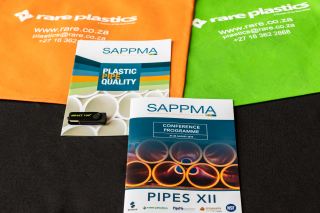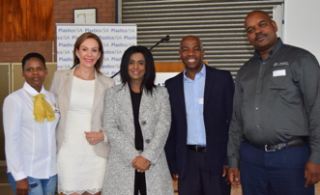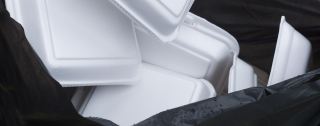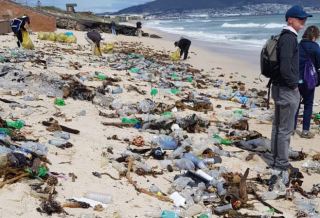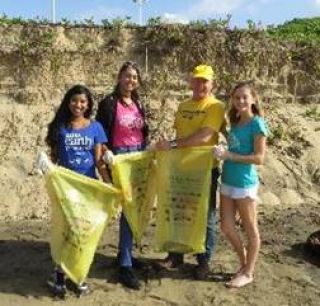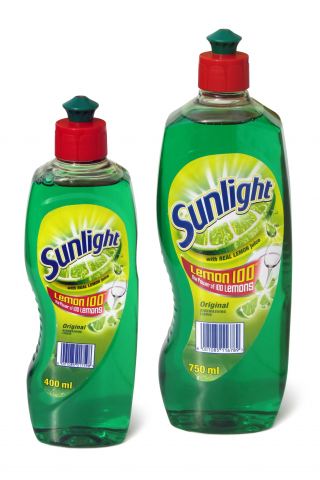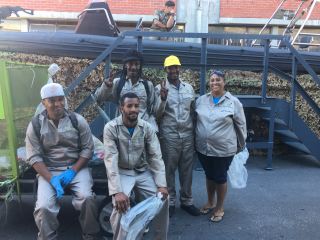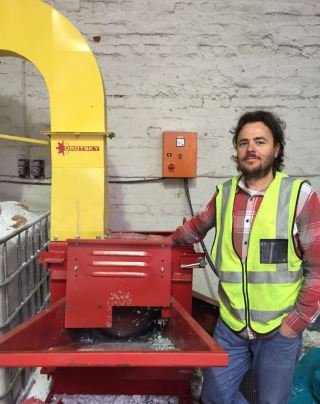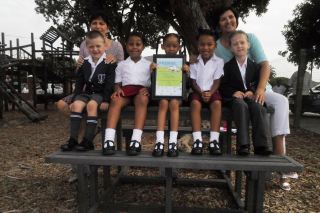GROWTH, OPPORTUNITY AND POSSIBILITIES FOR PLASTIC PIPE INDUSTRY
The Southern African Plastic Pipe Manufacturers’ Association - with the support of Rare Plastics, Sun Ace, Sizabantu Piping Systems, NSF International and Pipeflo - has concluded hosting its very successful PIPES XII Conference. This year’s event took place on the 27thand 28thof August at the Altron Conference Centre in Midrand and attracted more than 180 delegates, 11 local and 4 international presenters, 15 exhibitors and 9 sponsors who gathered to learn about best-practice designs and applications, share ideas and discuss the latest innovations in so far as plastic pipe manufacturing and installations are concerned. “This year’s event not only provided a platform for our own experts to present, but also drew international participation from as far afield as Germany, Austria and the Middle East. Delegates who attended represented a wide range of different ages, background and industries to include students and academics, engineers, industry representatives, local government, parastatals, pipe fittings and extrusion equipment manufacturers, raw material suppliers and consultants,” reported Jan Venter, Chief Executive Officer of SAPPMA.
Setting the stage: Good news for SA
Economist and scenario analyst Dr Roelof Botha, delivered an optimistic, witty and honest opening keynote address entitled: “Economic recovery beckons if the NDP is implemented” in which he unpacked the challenges and obstacles to growth, but also the exciting opportunities that await South Africa over the next 12 to 18 months. Whilst poor economic leadership over the last 10 years has left South Africa reeling and resulted in GDP losses of at least R2.5 trillion, R653 billion foregone in tax revenue of cost each South African an average of R48 thousand, Dr Botha said that it was not all doom and gloom. He shared good news of real growth reported in retail sales, mineral sales, short term insurance premiums, household and disposable income. “Every problem we have (in South Africa today) can be solved with the right policies and right skills,” Dr Botha said, highlighting the need for more infrastructure and better governance “We are starting to see various green shoots as the positive effect of President Ramaphosa’s leadership. If this continues we can be confident of the future. We have never been in a better position to grow the economy at significantly higher rates than ever before!”
The role of plastic in pipes
The theme of the 2019 PIPES XII Conference was, “Not all plastics are alike” and presenters were encouraged to present their ideas around this theme. “It is almost impossible to imagine our modern life without use of plastics. This versatile material has become deeply embedded in our everyday lifestyle. Although the use of plastic packaging has come under harsh criticism by environmentalists and the public alike over the past year, it is important to recognise that not all plastic is bad for the environment. It is an extremely useful product that is used with great success in pipelines, appliances, cables, computers etc to reduce manufacturing costs, improve performance and reduce mankind’s impact on the environment,” Venter said during his opening speech.
Bigger markets and growing demand
The other the presentations showed how research and development to improve the polymers and processing equipment are dynamic and ongoing throughout the world. This has resulted in the plastic pipe industry enjoying a dominant footprint in most countries. In South Africa, the market grew by 22 % over the past 7 years in order deliver the infrastructure needed support a growing population. Similarly, the development of new markets and applications were unpacked by the various presenters who focussed on outstanding properties of modern plastic pipes, such as flexibility, toughness, corrosion resistance, the growing demand for large diameter pipelines (with pressure pipe now up to 3m diameter), as well as various other exciting technological advancements and applications.
Feedback from presenters and delegates
Feedback received from the delegates were very positive. “This was my first attendance at a PIPES Conference and I thoroughly enjoyed the wide scope of presentations that were delivered. It was interesting to hear about the experiences from the end-users (engineers and consultants),” said Giel van Jaarsveld of SASOL, while Kudzai Jinjika of Proplastics said “the conference was exciting and informative. The excitement was maintained since the very beginning and the food and services were exquisite. I really wished it could be longer than two days!” “One of the best conferences I have attended, thank you!” said Japie Botha of Pro-Plan Consulting Engineers. International presenter Stefan Schiesser of Borealis said “This was a very open and fair conference with excellent possibilities for discussions in the breaks and at the end of the days,” while local presenter Onno Fortuin said “the interaction between industry, suppliers, engineers and planners are critical for the way forward”.
Looking ahead
“Modern plastic pipe materials can be relied upon to provide cost effective pumping solutions, exceptional health standards and previously unheard of service lives. For this reason, it is of great importance to host an annual industry-specific event where we can sharing the latest technical information about design, manufacture, maintenance, evaluation, testing procedures and standards. In an era where taking shortcuts and cutting corners have become the norm, SAPPMA plays an instrumental role in the development, advancement and maintenance of correct standards and performance of piping systems. Together with our members, we will continue to be the flagbearers for maintaining excellent standards and quality in a very important industry through the commissioning of reliable and knowledgeable consultants, pipe manufacturers and installers,” Venter concluded. For more information visit www.sappma.co.za
-- ENDS --
Note to the Editor:
SAPPMA as launched in 2004 to represent the interests of the well-developed plastic pipe business in South Africa and surrounding countries. The purpose of this voluntary, self-regulating association (registered as a Section 21 Company in terms of the Companies Act of SA) is to create consumer confidence within the plastic pipe industry by promoting the production and use of high quality plastic pipes and pipes systems. Only plastic pipes that are manufactured by SAPPMA members and are able to demonstrate that they meet local and international quality standards, are allowed to display the SAPPMA logo.
PLASTICS SA HOSTS INFORMATION SHARING BREAKFAST SESSIONS
Plastics|SA shared updates and latest developments within its training division with a series of well-attended breakfast sessions held around the country recently. The theme of this year’s breakfasts was ‘Curiosity: the path to life-long learning’.
Purpose of the sessions
Explaining the purpose of hosting these annual information-sharing sessions, Kirtida Bhana, Training Executive at Plastics|SA says: “These breakfasts provide the ideal platform to connect with our past, current and potential clients at the beginning of each year. It also allows us to highlight exciting activities in the training division, discuss the latest trends affecting their day-to-day business and identify any specific training needs they might have. The inspiring theme and related insights offered the attendees ‘food for thought’, rather than simply more information.
Training successes
The success of Plastics|SA’s training offerings is clear to see in the more than 3,500 students that successfully completed their training this past year at the company’s training centres in Johannesburg, Cape Town, and Durban. “We have been working hard to create oases of learning at each of these centres by upgrading facilities and equipment that will facilitate hands-on training and practical experience,” Kirtida adds. Commenting on the success of Plastics|SA’s training offering in their business, Geraldine Booyse of Bars Pharmaceuticals had this to say: “The content of the training modules is very interesting and the staff are very knowledgeable. They are able to share their expertise with students across different industries, keep our students motivated and boost their morale”. Michael Noel, an Engineer at Volkswagen who has benefitted from the Raw Materials Programmes at Plastics|SA, added his observation too. He said that Plastics|SA’s trainers have a real understanding of the industry; the students’ needs and how to impart much-needed knowledge in a practical and flexible way.
New and updated programmes
1. New Programme
Plastics|SA added one new programme to its training curriculum for 2018:
Generic Management – a qualification targeting managers, supervisors and all learners who have completed the NQF 4 and Supervisory Management Programmes. Each Learning Programme addresses the outcomes required for specific Unit Standards included in the National Certificate Generic Management – Generic Manufacturing on NQF 5.It consists of the following 5 phases – each of which can be completed separately:
- Phase 1:Workforce Management
- Phase 2:Workplace Operations, Change Management and Communication
- Phase 3:Workplace Risk, Coaching and Knowledge Management
- Phase 4:Workplace Process Optimisation and Efficiencies
- Phase 5: Workplace Project Management and Finances
Programme updates: Welding – addressing a growing need for training thermoplastic welders, Plastics|SA offers NQF2 -Welding in Thermoplastic Fabrication training at its premises in Gauteng, Cape Town and Durban, as well as at companies’ premises. Plastics|SA has done training countrywide in South Africa, as well as in countries such as Botswana, Mozambique, Namibia, Zambia, Tanzania, Malawi, Madagascar and Lesotho.The following is covered: Butt (HDPE) weldingElectro-fusion weldingHot Air weldingHot Air Extrusion weldingSocket Fusion welding: For pipes and fittingsSolvent Cement weldingOverlap welding
Setter skills – originally this Trade Qualification was developed at an NQF Level 4, but has now been reviewed and reworked to an NQF Level 5. Part Qualifications to the trade in the following processes have been developed at an NQF Level 4 viz. Injection Moulding, Blow Moulding and Pipe and Profile Extrusion.
Online learning – aimed at filling certain gaps in the market for soft skills, these online learning offerings were developed by Cross Knowledge in the UK.The programmes aim to transform employees and drive business results and refine and develop soft skills that could give you the competitive edge! Companies are able to purchase licences (one per user), which gives them access to 124 programmes that can be completed in their own time and at their own pace.
Production Technology - The National Certificate in Production Technology NQF Level 2 is a combination of learning outcomes that will provide the qualifying learner with vocational knowledge and skills appropriate to the context of production technology. This is the first qualification in a series of qualifications.
New extruders and blow moulders – Plastics|SA has added 3 new pipe and profile extruders and 3 new blow moulders in all 3 of our facilities around the country.
Conclusion: “We take great pride in offering our customers specialized, customized and contextualized material that addresses their individual needs and those of their workforce. It is hugely rewarding to receive feedback from our customers and the students that we have trained, but this does not mean that we get too comfortable.On the contrary, it inspires us to work even harder and refine our “pockets of excellence” through continuous improvement of training expertise in the various areas”, Kirtida concludes. For more information about the training programmes on offer at Plastics|SA, please visit their website at www.plasticsinfo.co.za/training.
POLYSTYRENE ASSOCIATION RESPONDS TO DEA LABEL OF “PROBLEM PLASTIC”
“It is an excellent product that gets the job done. The problem does not lie with the material, but with how it is discarded and highlights the need for waste infrastructure to be developed. We believe we have a viable solution to this problem…”
The Polystyrene Association of South Africa (PolySA) has responded to a statement made by the Portfolio Committee on Environmental Affairs before the National Assembly yesterday, that polystyrene is one of the five so-called “problem plastic products” that have a short lifespan and are the biggest culprits in our environment. The other items on this list are plastic cutlery, stirrers, earbuds and straws.
The Association’s Chief Executive Officer, Adri Spangenberg, said that polystyrene is so much more than just a single-use plastic, given the fact that South Africa has developed various end-markets that use recycled polystyrene with great effect.
“During the 2017-2018 financial year, more than 6 300 tons of polystyrene were successfully diverted from our country’s landfills and recycled in South Africa. Considering that our recycling figures stood at 1 849 tons in 2013, we are very proud of this growth – proving that the local polystyrene recycling industry is growing and thriving,” she said.
Spangenberg said recycled polystyrene is in great demand by recyclers, who use the material in the production of picture frames, cornices and stationery. “The biggest demand for polystyrene, however, has comes from the building and construction industry where recycled polystyrene is used in the production of lightweight concrete bricks and screeds. Polystyrene used in this application can be of any colour or grade, clean or slightly contaminated as it gets chopped up and mixed with a special mixture of cement and other ingredients to form lightweight concrete that is waterproof, fire resistant, offers insulation against heat and cold and it is cheaper and easier to build with than traditional bricks or concrete”.
The Association acknowledges that polystyrene is one of the items frequently found in the environment, owing to the fact that it is incredibly lightweight and is therefore easily scooped up and blown away by the wind.
“94 % of polystyrene is air, and only 6 % is product. This gives polystyrene the reputation of being “engineered air” that has the lowest carbon footprint of all packaging materials, in addition to being affordable. It protects valuable goods and food from breakage or spoilage and is an excellent insulator for hot or cold foods and beverages. In short, it is a material that gets the job done. The problem therefore does not lie with the material, but how it is discarded after use. In our opinion, this highlights the need for proper waste management infrastructure to be developed and implemented by municipalities around the country,” Spangenberg stresses.
The Department of Environmental Affairs agreed that the country cannot afford a knee-jerk reaction to problematic single-use plastics and has called for a thorough socio-economic impact assessment to measure the effect that alternatives to these problem products will have on the industry, consumers and jobs.
“The plastics industry provides employment to more than 60 000 people and the Polystyrene Association has recently unveiled exciting plans that will see this figure increase even further. We are partnering with municipalities to take polystyrene collection and recycling to the people with the establishment of Polystyrene Trading Hubs in the larger metro cities and Municipal Polystyrene Recycling Hubs in outlying areas. These hubs will address will provide a much-needed solution for housing, employment and the waste crisis by enabling communities to collect, recycle and produce the material they need to address the build houses in their immediate area”.
Projections are that polystyrene recycling in South Africa will be increased by to 63.7 % (27 870 tons) per annum by 2023 with these hubs.
“Banning polystyrene just as we are on the cusp of an exciting breakthrough, will jeopardize the future employment of thousands of people and undermine the excellent work we have been doing over the last 11 years. Our industry is committed to finding a solution that will permanently bring an end to plastics polluting the environment. We invite Government and other stakeholders to engage with us in the weeks and months to come as we work together to find what we believe can undoubtedly be a win-win solution that the rest of the world can follow,” Spangenberg concluded.
For more information, visit www.polystyrenesa.co.za
Initiative to Capture Cape Town’s Trash Before it Hits the Coast
The City of Cape Town has joined key players and interested groups in the first of many meetings, to investigate ways to remove garbage from Cape Town’s rivers so it doesn’t make it into the ocean.
Included at the meeting were Plastics|SA, the South African Department of Environmental Affairs, Woolworths, The Percy Fitzpatrick Institute of African Ornithology, The Polyolefin Recycling Company (Polyco), Cape Town non-profit organisation Clean C, local digital marketing firm Gnu World Media and several other groups.
John Kieser, Sustainability Manager of Plastics|SA and facilitator at the meeting, says the main goal of this network will be to share information, ideas and resources for minimising the amount of litter that washes into the city’s seas.
Black River in Observatory is the first focus area. Already, Plastics|SA and the City of Cape Town’s Environmental Management Department have set up a system to remove litter floating on the river – 80 to 90% of which is plastic. A team gathers plastic at designated areas once or twice a week and takes it to Bokmakierie Primary School, where it’s separated and sent off for recycling.
In KwaZulu-Natal, the Department of Environmental Affairs is currently conducting similar projects, focusing on the Umgeni and three other rivers. If all goes to plan, the Department may consider funding similar Expanded Public Works Programme (EPWP) projects in Cape Town.
In the meantime, Kieser says the Cape Town network of groups will prevent people with the same vision – keeping our rivers and thus our oceans clean – from working in silos.
“It’s great that the plastics industry is facilitating this kind of dialogue,” says Gregory Player of NPO Clean C. With support from Cape Town-based digital marketing firm Gnu World, Clean C is working on a similar project – installing litter-catching nets over stormwater drains in the 4 kilometres between Sunset Beach and Milnerton Lagoon. Large amounts of household and general refuse – mostly plastic – washes into the lagoon from drains in areas including Joe Slovo, Sanddrift and Milnerton and then ends up on the beach and in the ocean.
The project would require a trained team of five to do regular clean-ups, and equipment like wheelie bins, uniforms, and a truck to transport the collected garbage.
Player says many EPWP projects run only in the short term and that most of the achieved improvements are lost once funding ends. “We’d like sponsorships to get the project off the ground – but once it’s implemented, we will move towards making it self-sustaining,” says Player.
Taryn Nightingale, PR and outreach specialist at Gnu World Media, says, “People forget that we form part of the same ecosystem the rivers, plants, oceans and animals do. We need to change how we view plastic and its value. When it’s recycled, there’s the opportunity to earn money from it, but when thrown away, it has grim consequences.
”Currently, only 5% of South Africans recycle. Mandy Naudé, CEO of Polyco, says the main reasons for this are a lack of education, incentive and infrastructure. “We must make it convenient for South Africans to recycle.” The organisation recently launched PACKA-CHING, which aims to increase recycling in informal settlements and lower-income areas. It has been running in Langa for about a year, and has resulted in the removal of about 240 000 kilograms of plastic since its inception.
Anyone interested in joining this network of plastic catchers or in helping in some way can contact John Kieser at This email address is being protected from spambots. You need JavaScript enabled to view it..
SA PLASTICS INDUSTRY LAUNCHES OPERATION CLEAN SWEEP
The South African plastics industry recently launched Operation Clean Sweep on World Oceans Day (8 June 2017) at the uShaka Marine World, Durban.
According to Douw Steyn, Sustainability Director at Plastics|SA, the primary goal of the campaign is to stop plastic pellets, flakes and powder used in the plastics industry, from reaching the sea.
“We as the plastics industry produce the pellets and flakes used to manufacture plastic bags, bottles and other plastic products. When these micro-plastics are spilt during the manufacturing process, they are swept into drains from where they enter the sewerage system and eventually end up in our rivers and ultimately the sea. These pellets are smaller than a sunflower seed, therefore not easy to pick up during regular beach clean-ups. As a result, they are ingested by turtles, birds and marine life," Steyn explains.
Mark Liptrot, Sustainability Manager at the packaging company, Constantia Afripak, said the extended effect of plastics on the ocean is a growing problem as micro-plastics attract chemical pollutants that are ingested by marine life, which, in turn, is eaten by other marine animals.
Addressing the media, industry and members of the public who attended the breakfast launch, Steyn emphasised that plastics are integral to every aspect of our lives, particularly in protecting food from contamination.
“It is where we use it, how we use it and what we do with the plastic product once we are done with it,that is important. To address this problem and offer a workable solution, Plastics|SA launched “Operation Clean Sweep” - a worldwide drive aimed at reducing the amount of plastic pellets that end up in rivers and ultimately in the ocean”, Steyn said.
He added that the plastics industry as a whole had a role to play –from the producers and importers of raw materials pellets and flakes, to the converters and manufacturers of plastic products, as well as the recycling companies.
"Our goal is to achieve zero pellet, flake, and powder loss. Whilst it might seem to be an ambitious target, we believe it is possible through containment and the implementation of good housekeeping practices,” he said.
Catherine Constantinides, head of Miss Earth South Africa endorsed Operation Clean Sweep. “To help highlight the importance of clean oceans, Miss Earth SA ambassadors took part in 100 beach clean-ups across the country. But it's not just cleaning up that's important. Educating and creating awareness are equally necessary. If we don’t educate, we will be doing clean-ups for the next 20 years of World Ocean Day. We are appealing to retailers and the public at large to realise that they too have a vital role to play in ensuring that plastic products and waste do not end up polluting the environment," Constantinides implored.
Notes to the editor:
World Oceans Day Background:
The Ocean Project has promoted and coordinated World Oceans Day globally since 2002. We do so with a team based in the US and also advisors and volunteers in dozens of countries. We are a collaborative organization and work in partnership with hundreds of organizations, including World Ocean Network, the Association of Zoos and Aquariums, and many other networks from all sectors. Thank you to the Government of Canada for proposing the concept of a World Ocean Day, at the Earth Summit in Rio de Janeiro in 1992, and to the United Nations for officially recognizing 8 June as World Oceans Day, since late 2008. World Oceans Day® is trademarked to protect it from those who might have commercial or counterproductive interests. All information, materials and resources on this site and associated with World Oceans Day are free to use to those who are celebrating World Oceans Day as a way to bring about a healthier ocean and a better future.
World Oceans Day is celebrated around the world in cities and rural villages, close to the sea and far inland. In fact, over 600 events were hosted around the world last year.
ENDS
Entries now open for Recycled Plastic Product of the Year Awards
South African Plastics Recycling Organisation (SAPRO) is inviting entries to this year’s Recycled Plastic Product of the Year Awards.
SAPRO is proud to announce the sixth prestigious competition, with the aim of acknowledging the wide variety of products that are locally manufactured using recycled materials.
History of the competition
The Recycled Plastic Product of the Year Awards were held for the first time in 2010 and has been dubbed “The Oscars of the plastics recycling industry”. Each year the competition grows both in the number of entries and in the variety of different products being submitted.
This biennial competition showcases the tremendous amount of ingenuity and creativity our local product designers have, and aims to encourage brand owners to seriously consider recycled plastics as a material of choice. Whether they are designing packaging or pallets, shoes or shopping bags, this competition has demonstrated that there is no limitation to where and how recycled plastics can be used.
Previous overall winners include the City of Cape Town and MPACT Plastic Containers with their Fifty/50 Wheelie Bin (2015), Unilever with their Sunlight Dishwashing bottle (2013), Lasher Tools with their Eco-Wheelbarrow (2012), Woolworths and Polypet with their 1.5 litre juice bottle (2011) and Tufflex Materials with their innovative railway sleeper made from mixed materials (2010).
Winners of this year’s competition will be announced at a gala dinner in Gauteng during Clean-Up and Recycle SA Week (11-17 September 2017).
Product categories and judging criteria
In order to encourage even greater participation and entries by local converters and innovators, this year’s competition will have the following five distinct product categories:
- Products made from 100% post-consumer recyclate
- Products containing a percentage post-consumer recyclate
- Products made from recycled mixed materials
- Novel and Artistic products - i.e. articles made from discarded plastics products
- And for the first time, there is also a “New Ideas” category - anything that can be made from recycled materials. It does not have to be a product as yet, just the idea clearly explained on a poster, mock-ups or a good explanation
A gold, silver and bronze winner will be announced in each of these product categories, which will also acknowledge the recycler of the material, the manufacturer of the product as well as the brand owner in front of the auspicious audience during the gala awards ceremony. The overall winning entry will walk away with the SAPRO trophy for The Best Recycled Product for 2017.
Entries will be judged on a number of criteria by a panel of judges who are experts in plastics, packaging, recycling, product design and marketing. The criteria they will use when adjudicating each entry includes: the life expectancy of the product, the sustainability (i.e. long-term demand and market acceptance of product), the measures taken to ensure product consistency and customer satisfaction despite recycled material content, tonnage (or potential tonnages) of plastics that were converted and therefore diverted from landfill, technical achievements in manufacturing to overcome recycled material challenges, replacement of alternative materials and the so-called “Wow-factor” of the product.
Although various weighting could be used to judge products objectively, we are looking for products that will grow the demand for recyclate, help to focus on the quality of products and to stimulate innovation – all aspects needed for a vibrant plastics recycling industry.
Rules, regulations and entry forms
Any company in the SADC region may enter the competition, provided that the recycled material originated in South Africa. Products that were entered in previous years’ competitions, but failed to win, are also eligible to enter again. The closing date for entries is Thursday, 10 August 2017.We look forward to receiving a record amount of entries for this year’s competition. The very fact that recycling industries both locally and internationally are under severe pressure and are fighting to survive, serves to highlight the importance of showcase events such as these.
We need to make sure that decision makers are made aware of the versatility of recycled plastics and the important role this industry plays in job creation, diverting waste from landfill and growing the economy.
Entry forms and competition rules can be obtained online from SAPRO’s website (http://www.plasticrecyclingsa.co.za).
Rich booty of waste collected at 2017 SA Navy Festival
The Plastics|SA Clean-Up crews were once again in action at this year’s SA Navy Festival that took place at the Simonstown harbour from the 17th to the 19th of March.
According to John Kieser, Plastics|SA’s Sustainability Manager and coordinator of the clean-up crews, each year close to 50 000 people visit this event daily for the chance to see some of the country’s biggest naval ships and exhibitions on display.
“This is a very popular festival that is always very well attended by members of the public. As a result, we find that it also produces the biggest variety of waste,” Kieser says. Large volumes of Expanded Polystyrene (EPS), aluminium cooldrink cans and Low-Density Polyethylene (LDPE) were sent away for recycling, whilst organic waste was sent away for composting to Noordhoek.
“We managed to collect approximately 35 large bags of good quality polystyrene that were discarded in the form of take-away containers, but also protective packaging that was used around the ammunition and valuable items that were on display,” Kieser said. This material was delivered to a Cape Town based recycler who uses the post-consumer polystyrene in lightweight concrete used for building and construction applications.
“Our sincere gratitude goes to the Plastics|SA Sustainability Council for the excellent work they are doing on the ground at these events by working closely with the clean-up crews, but also in manning the exhibition stands where they educate members of the public about the importance of recycling. Through their on-going, consistent and visible efforts, they bolster the recycling efforts of the various material recovery organisations (MROs) and help us to divert tons of valuable material from our country’s landfills,” says Adri Spangenberg, Director of the Polystyrene Packaging Council (PSPC).
The final big sporting and spectator event on the Plastics|SA Clean-Up crew’s agenda for this month is the Old Mutual Two Oceans Marathon that will be taking place on the 15th of April 2017.
SA Vinyls Association welcomes Chembridge Additives as newest member
The Southern African Vinyls Association (SAVA) is pleased to welcome Chembridge Additives as new members. This specialist distributor of plastic additives is based in Pretoria, and began its operations in 2008 as the appointed agent for Lanxess Germany GmbH and Tanatex Chemicals GmbH - servicing a multitude of industries.
“We provide plastics additives, phosphorus, specialty chemicals such as organic and inorganic colorants and surfactants to a very wide range of industrial sectors. Our focus is on the supply of high-quality additives and finishing chemicals for the plastic industry. These products improve the processability of ingredients and the properties of the end products. Our product portfolio includes flame retardants, plasticisers, bonding agents, blowing agents, and colourants. We distribute to all customers, big or small, in any quantity required throughout Southern Africa from our network of warehouses in Johannesburg, Durban and Cape Town,” explains Deon Steenkamp, owner of Chembridge Additives.
Commenting on their motivation for joining SAVA, Steenkamp says that the Chembridge products and business philosophy align strongly with SAVA’s Product Stewardship Commitment (PSC).
“We heard about SAVA and the excellent work they are doing through our customers. We wanted to be associated with such a strong industry body that is committed to representing its members’ interests in the Southern Africa region by creating consumer confidence within the industry and by actively developing and sustaining markets for PVC. We are very excited about the prospects SAVA membership will afford our business and look forward to the networking opportunities with other members, which would most definitely have a positive impact on our business,” he said.
“SAVA is dependent on the backing and participation of its members, and we applaud Chembridge Additives for making the public commitment to sustainable practices by joining our ranks. By steadily growing our membership, we are able to strengthen our voice and expand our influence in the marketplace on topics that have a direct impact on the future of our industry,” said Delanie Bezuidenhout, CEO of SAVA.
“The more we as the local PVC industry can work and stand together, the stronger we can grow. We welcome any player who is willing to invest the energy, time and money needed to promote the vinyl industry, share ideas and address concerns. In return, we offer our members a platform where they are equipped to protect their investments through knowledge. They share a camaraderie that is envied by others and most of them are reaping the rewards of membership through constant business coming their way,” she concluded.
For more information on SAVA visit www.savinyls.co.za or on Chembridge Additives visit www.chembridgeadditives.co.za
Polystyrene recycling in SA continues to exceed expectations
Polystyrene recycling in South Africa has continued to grow in 2016, contrary to international reports that labelled this versatile product as “challenging to recycle” and sometimes even as being unrecyclable.
According to Polystyrene Packaging Council Director, Adri Spangenberg, the reprocessing of expanded and high impact polystyrene has increased by 106 % between the period 2013 and 2015 in South Africa owing to the fact that more end-markets were developed and knowledge of the fact that the material can successfully be reused in various different applications, continued to grow.
“We are still awaiting the official recycling figures for 2016, but early indications show that approximately 3 600 tons of recycled polystyrene were added to the traditional recycling figures – making this our best year to date,” Adri says.
“We have managed to prove that polystyrene can successfully be recovered from households and industries by working closely with waste management companies and municipalities. Moreover, our recycling projects are undoubtedly successful and yet another proof that South Africa is a truly unique country. We may be small, but we have our own way of doing things and have an ability to find solutions to problems that the rest of the world might find insurmountable,” she says.
Polystyrene is widely being used by spaza shops, take-away vendors, cafeterias and supermarkets around the country due to the fact that it insulates food and beverages, protects food and contents, is cost-effective, lightweight and convenient. Although it is a single-use plastic item, it gets recycled into items that continue to improve lives and create jobs in a variety of different industries, ranging from building and construction, to picture frames, cornices and home décor, clothing hangers and stationery.
“Last year alone, 2 036 tons of polystyrene were successfully recycled for use in lightweight concrete through our Project Build,” Spangeberg says. Hilton Cowie of Greenlite Concrete (http://greenliteconcrete.co.za) in Cape Town and Hennie Snyman of the Get Connected Group in Gauteng were the two biggest projects the PSPC currently supports, and uses recycled, post-consumer polystyrene for large commercial and residential construction projects around the country.
“We needed to have hammermills installed at both these premises last year in order to assist with the processing of the large volumes of polystyrene that are required for their construction projects. These mills are capable of pelletizing 150 kg of expanded polystyrene per hour in order to keep up with the demand,” she explains.
Another area that has seen impressive growth in the amount of recycled polystyrene it used, was the home décor market. More than 1 377 tons of expanded and high impact polystyrene were recycled last year for use in picture frames, cornices and curtain rods through the PSPC’s Project Dècor.
“Apart from the fact that it helped divert polystyrene from landfill, we are particularly pleased that this is another market where jobs and products were manufactured locally as opposed to relying on cheap imports from the Far East that have a detrimental impact on our own markets,” Spangenberg adds.
Looking ahead at 2017, the PSPC will continue to promote the use and the recycling of polystyrene to South Africans of all walks of life. “The Davos World Economic Forum gathering released their report last week in which they called for strategies to dramatically increase recycling of plastic packaging — from the current 14 % to 70 %.
So, whether you are an avid gardener who gets your plants from seedling trays, a business person getting your morning coffee from the work’s canteen or a miner enjoying your afternoon lunch from the cafeteria, the polystyrene you use should be recycled. Plastic is worth much more than its original purpose when used in infrastructure applications. For this reason, we believe that polystyrene should be re-used and recycled into building projects that will benefit many generations to come. Our polystyrene recycling projects not only touch lives and improve communities, but are also key to reclaiming useful carbons and a valuable resource that would otherwise have been lost. Polystyrene recycling helps to create jobs, opportunities and innovative new products in a true, circular economy model,” Spangenberg concludes.
Kabega Primary Wins Clean-up And Recycle Competition
Kabega Primary School in Port Elizabeth has once again proven their mettle as a group of learners committed to sustainability and cleaning up their environment, by emerging victorious in Plastics|SA’s annual Clean-Up and Recycle Competition.
According to Jacques Lightfoot, Sustainability Manager at Plastics|SA, the aim of this yearly competition is to encourage schools, organisations and the public to involve their friends, family and communities in a clean-up or recycling activity.
“We required the entrants to supply us with a short report and photographs of their initiatives as part of our Clean-Up and Recycle SA Week activities,” Lightfoot said.
This event was sponsored by Plastics|SA’s Sustainability Council, Pioneer Plastics and Tufflex and offered exciting prizes, including cash prizes, a 6-seater picnic table and a 3-seater bench made from recycled plastics and a four-in-one recycling station. Entries for this year’s competition came from schools around South Africa.
“We judged the entries based on how many participants were involved in their respective projects and whether they managed to involve their community. Kabega Primary was a clear winner and stood out for us because of the amount of recycling and other environmental and sustainability work it does. It is an amazing school that is clearly dedicated to making a difference in their environment as they organized clean-ups in Baakens River Valley, Willows and Seaview,” Lightfoot said.
The school received as its prize an award certificate and a bench made of recycled plastic which was placed in the Grade 1 area of the school, in order to make the little ones aware of the school's green emphasis. Vaalpark Primary came second in the Primary School Category, and Louise Van Tonder was named the winner in the Organisation Category.
“We were once again unbelievably impressed with how industrious, creative and motivated the young people can be when it comes to bringing about real and lasting change in their environments. We wish to extend our congratulations and compliments to every entrant on their exceptional effort and look forward to next year’s entries,” Lightfoot concluded.
For more information, visit www.plasticsinfo.co.za

